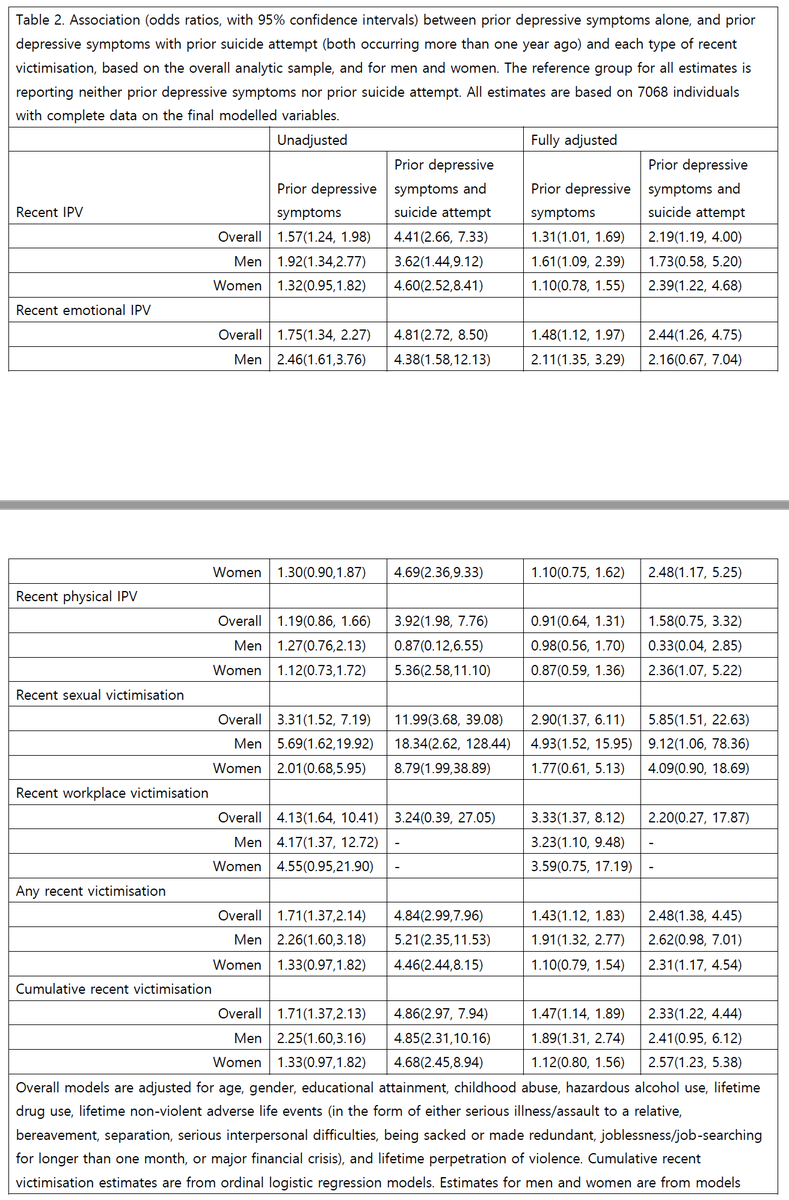I have a new open access paper on mood, suicide, and violence out today in European Psychiatry @EurPsy . Here is a thread if you’re interested!  https://abs.twimg.com/emoji/v2/... draggable="false" alt="🧐" title="Face with monocle" aria-label="Emoji: Face with monocle">
https://abs.twimg.com/emoji/v2/... draggable="false" alt="🧐" title="Face with monocle" aria-label="Emoji: Face with monocle">
People using mental health services experience greater violence. Understanding mechanisms for this inequality, and how this violence is distributed according to different settings and forms of violence(e.g. domestic violence vs. workplace violence),is key to future interventions.
Detailed information on types of violence experienced by service users has been difficult to gather in the UK. Landmark work by @DrHKhalifeh @soniajohnson @SWMHIOPPN attempted to do this: https://www.cambridge.org/core/journals/psychological-medicine/article/domestic-and-sexual-violence-against-patients-with-severe-mental-illness/A7787F698B3B2FBAEA8172A34F3CF246).">https://www.cambridge.org/core/jour...
There is also important recent work on this topic from @AmirSariaslan: https://jamanetwork.com/journals/jamapsychiatry/article-abstract/2758324">https://jamanetwork.com/journals/... . More on this below.
In our paper, we asked a slightly different question. We wanted to know if people with a history of common mental health symptoms(feeling sad, miserable, depressed) in the general population, who weren& #39;t necessarily service users, also experienced greater subsequent violence.
Our data was from a national survey of 7403 English adults taken in 2007. We used self-reported data on experienced violence across four domains: intimate partner violence(physical and emotional), sexual violence, and workplace violence.
We tested overlap between previous depressive symptoms and subsequent victimisation across these domains, and looked at the possible role of gender, childhood trauma, abuse, disadvantage, and violence perpetration.
We were also interested in whether people with possibly more severe depressive symptoms in the past(approximated by whether they reported attempting suicide) were more likely to report victimisation.
What did we find? With some differences between men and women, people with previous depressive symptoms were more likely to report subsequent experiences of violence in workplace and domestic settings, and this was evident for physical, emotional and sexual violence. TABLE:
Why is this important? This evidence is from a large random and representative English sample and can inform national public health knowledge on who experiences violence in the English population as a whole.
We confirm once again that violent behaviour does not explain why people with mental health problems experience greater violence.This is among the first findings suggesting greater workplace violence, and sexual violence, experienced by people with common mental health problems.
This isn& #39;t always captured when you study administrative registers.Our paper is worth reading alongside recent correspondence in @JAMAPsych on @AmirSariaslan ’s paper, where distinct advantages/disadvantages of administrative registers, c.f. surveys, to study this are discussed:
https://jamanetwork.com/journals/jamapsychiatry/article-abstract/2765487?casa_token=L6MxLiEFiIIAAAAA:u2xg1iH3Wfvt3hbfc5E7aKvmBz8U64K4O2-XdtFjPmFShwmvm4lL7WJ4aaeRk_TFfjrO0d-o">https://jamanetwork.com/journals/... .
In conclusion, violence affects people with mental health problems across a continuum of severity, pointing to the importance of public health approaches, as well as improving MH services.
For services, the challenge remains to understand how to effectively intervene to reduce greater violence experienced by people with mental illness, for example whether there are modifiable environmental risk factors. More on this to come hopefully.
I started this work in 2016. Thanks to co-authors @McManusSally, @HatchStephani,&Kimberlie Dean @NatCen @KingsHSPR @UNSW, and to Professor Louise Howard for helpful comments, and her support @SWMH_IoPPN. Thanks to @UKDataService who supplied data, and to the @wellcometrust .
If you are interested in reading more(including about the limitations),here is a link to the paper: https://www.cambridge.org/core/journals/european-psychiatry/article/association-of-prior-depressive-symptoms-and-suicide-attempts-with-subsequent-victimisation-analysis-of-populationbased-data-from-the-adult-psychiatric-morbidity-survey/CA9B43E4CABEAC0D56E4C7DCDDB2CABE">https://www.cambridge.org/core/jour... . Thanks for reading.

 Read on Twitter
Read on Twitter


